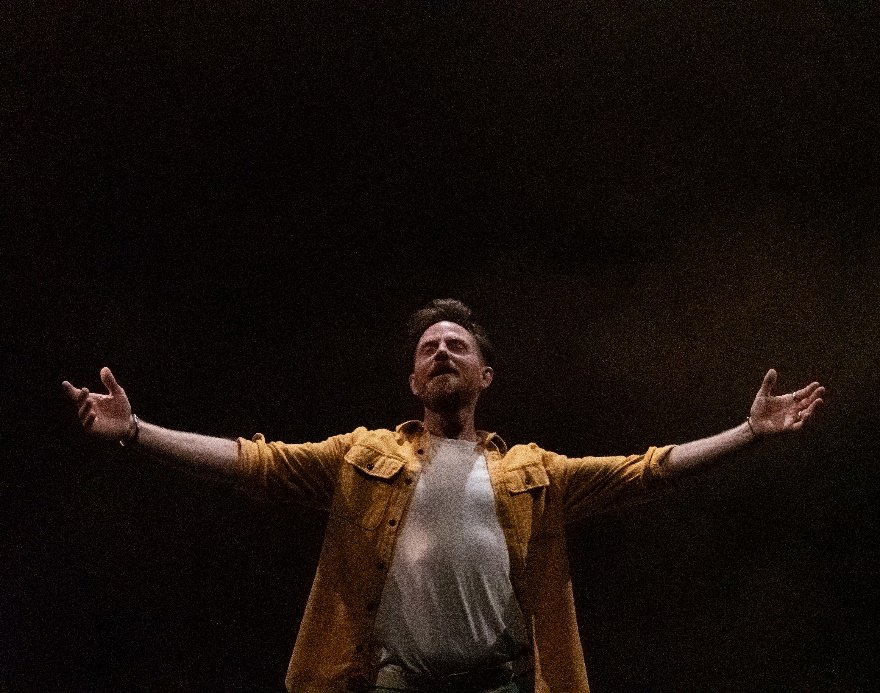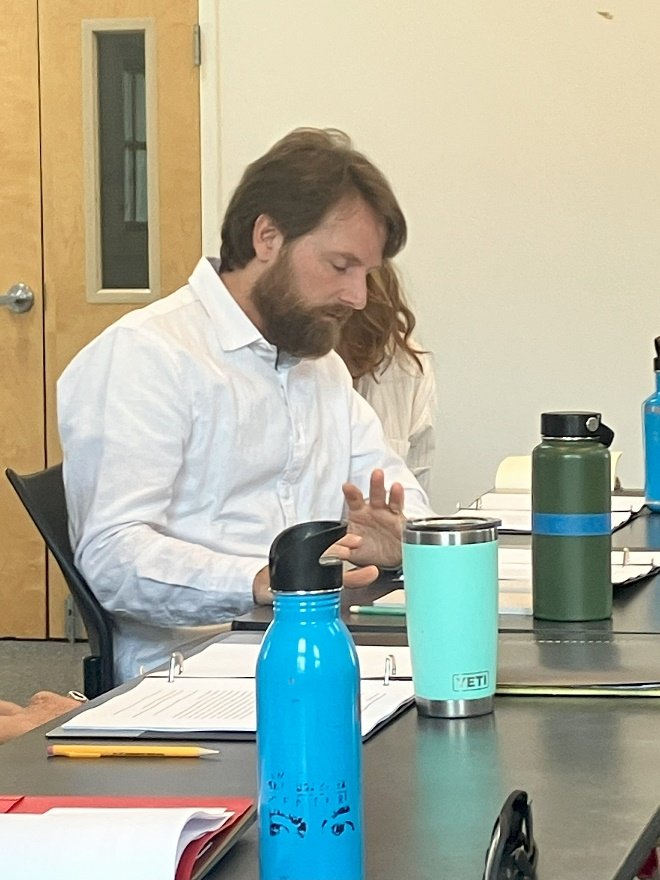The Stones: Behind the Scenes
Director Notes by Michelle Joyner
Michelle Joyner in rehearsal/credit: Kat Humes
THE STONES is a play that covers a lot of ground: Guilt, obsession, cycles of history, memory, climate, greed. But at its center it explores our resistance to examining the things that we choose not to see, and the ultimate consequences of not seeing them. Or of fixating on things that perhaps are completely in the past and over which we have no control-- but all the while the things that we should be seeing are creeping up over our shoulder!
The play asks a lot of questions-- but the answers need to be parsed out. Is this a ghost story? A revenge story? A cautionary tale? What would happen if, just for a moment, we were able to see things stripped down to what they actually are with no artifice-- as is the case with our storyteller? What would that do to our psyche, our defense mechanisms?
I first saw Kit Brookman’s play last season at the Edinburgh Festival, where I was performing. I was seeking out plays that looked like they might be scary or mysterious, as research for a play I had just finished writing. I wasn’t thinking this would be my next directing project, but I couldn’t get it out of my mind. Cut to this year, and I am back at GBPT with my own production, and the American premiere; one which differs significantly from the one I saw. One big change was the addition of musicians to provide soundscape, memory, planetary trauma, song and psyche.
Ours is a story of nature in distress, under the guise of a storyteller who is being pulled into a whirlpool of terror as memory and catastrophe inevitably collide.
Lean in. Listen. Beware!
Michelle Joyner & Ryan Winkles/credit: Kat Humes
Ryan Winkles as Nick/credit: Kat Humes
Ryan Winkles in performance/credit: Kat Humes
Ryan Winkles in performance/credit: Kat Humes
Ryan Winkles in rehearsal/credit: Kat Humes
Ryan Winkles and musician/performers Alex Sovronsly and Wendy Welch/credit: Kat Humes
Quick take on upcoming play
The Stones is a mind-twisting, present-day gothic mystery directed by Michelle Joyner, with Ryan Winkles in a tour de force solo performance as the haunted school teacher Nick. They took a few minutes out of rehearsal to give a quick take on their upcoming play.
You both see and know plenty of theater. What drew you to The Stones?
Michelle: I saw The Stones at the Edinburgh Festival, where I was performing last summer. We were both in the Assembly Rooms, and I was searching out shows that seemed spooky or scary as research on a play that I'd just finished writing. The Stones is the story of Nick, a teacher going through a personal crisis who reluctantly takes a job on a large estate in the countryside, tutoring two young children. A mystery slowly unravels.
This play succeeds in ratcheting up tension very subtly, but I felt myself and the audience leaning in, as though listening to an eerie story around a campfire. At that point, I had no idea that it would be my next directing project. I was seeing multiple shows a day, as well as performing an original piece, so it was all quite hectic. I bought the play after the show, tucked it away, but found that I kept thinking about the story. It is rather oblique, which I always find compelling. What exactly happened in this play, to this character? Is it a ghost story? How can the mystery be sorted out? I later took the play out and read it, searching for clues. I'm not one who likes spoon-fed entertainment. I want to parse and ruminate. The Stones is unnerving, and I was hooked.
Ryan: I didn't know anything about the play until Michelle sent it to me. Reading through it for the first time I was struck by how alive the world was: the places, the sounds, the landscapes. And the story unfolds in some really surprising ways that left me wondering.
So how does its appeal carryover to American audiences?
Michelle: This play is written by an Australian and takes place in current day England. But the themes of guilt, revenge, crisis, delusion, and longing are certainly ones that everyone can relate to. I know that I can! And Kit Brookman is able to make the rather unsettling themes funny. Kit has talked about examining the things that we choose not to see, and the consequences of not seeing them. Or of fixating on things that perhaps are completely in the past and over which we have no control-- but all the while the things that we should be seeing are creeping up over our shoulder!
Ryan: I think American audiences love a good strange tale that takes place in the British Isles. I think of modern shows like Sherlock, Broadchurch, or Fleabag. We, the audience, are transported to a place that is far off but also familiar. And the story is not simply about a person from London, it's about what it's like to be a person trying to make sense of a confusing world. What are the things that are important and what are the things that are just distractions? And I find the play to be spooky and odd and funny...so I am curious to discover what other people think of it.
What makes it a present-day gothic?
Michelle: The playwright describes gothic horror stories as ones that activate a moral dilemma, and create a striking sense of metaphor that is very easy to engage with. You can tackle these all-consuming subjects and create an entire world and characters in oblique ways that create ominous fear. I personally love being scared in the theater. I find it thrilling! But in this case, it's subtle--it creeps up on you. This is a play about guilt, about heavy things from the past that drag on both the present and the future. The central character experiences a moment of insight that’s followed by a disorienting step into a world he begins to recognize less and less. Kit’s writing is tremendously lyrical, but very human, intensely observant and also humorous, a naturally winning combination.
Ryan: I love that you used that term because when people ask me about the play it is a word I keep coming back to. There's a quality of dark uneasiness about the play that hopefully keeps people trying to sort out what's going on. Is there something otherworldly at play? What's with the weather?
Michelle, what are you adding to it, bringing in that was not in the 2022 version?
I will be adding two musicians to the show that will act as a chorus of sorts. They will represent ghosts, characters, mood, song and create a soundscape for the environment. Both of the musicians, Alexander Sovronsky and Wendy Welch are also talented actors. I'm excited to uncover the myriad possibilities as we incorporate them into the piece, while still keeping it spare.
And why did you want to cast Ryan? Have you worked with him before? What aspects does he bring to Nick?
I've directed Ryan in several readings and have always been a fan-- we have overlapped at Shakespeare and Co. over the course of a few seasons. He has a depth of experience with vivid language, and a keen ability to make words leap off the page in a visceral way. I love his sense of play and humor, but he has rich vulnerability, which I think is perfect for the character of Nick. He's boyish but not coy. There is real deepness under the facade. It's a lovely combination.
Ryan, what can you tell us about Nick's core character?
I think Nick spends much of the play asking that question of himself. He has an experience that changes his perspective on everything and then he's off on this journey of discovery. What are the things that matter and what are the things that don't? And what are the consequences of not knowing the difference?
And have you worked with Michelle before? What does Michelle bring to Nick?
I've worked with Michelle on a couple of staged readings and smaller things but this will be our first time collaborating on a fully produced project. She's passionate and smart and I am excited to work with her on this. We chatted a little bit last week about her ideas regarding the play and the production and now I am excited to get into the room and explore.
Can you compare The Stones to a story or play that audiences might know?
Michelle: The first story that comes to mind is Henry James The Turn of the Screw. But there are also scenes reminiscent of parts of films like Eyes Wide Shut and The Wicker Man. But the comparisons are loose, not exact. The Stones is a very unique and personal story. As it is a solo show, we are only allowed to know what the character of Nick is willing to share with us. And as he is increasingly terrorized, it begs the question: Is he a reliable narrator? Is he delusional? Is his world ending, or is our world ending? The play doesn't necessarily provide easy answers, but is certainly one that will stay with you long afterwards, inviting you to decide for yourself.
Ryan: I think of classic stories like Jane Eyre, or Hound of the Baskervilles. If there was a stew of modern stories that might come close to what The Stones is like then that simmering pot would probably include novels like Less by Andrew Sean Greer and Elena Ferrante's Neapolitan novels...and a bit of Stephen King. There would also be spoonsful of tv shows like Succession, Fleabag, Broadchurch, and maybe the smallest dash of Abbott Elementary. But I wonder.. It could very well be that someone seeing The Stones might have a whole different list of ingredients. I'm very curious to see.








